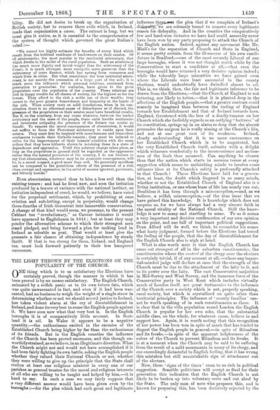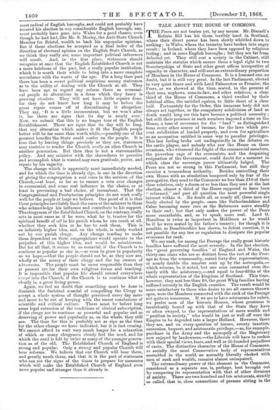THE LIGHT THROWN BY THE ELECTIONS ON THE POPULARITY OF
THE CHURCH.
ONE thing which is to us satisfactory the Elections have certainly proved, though the manner in which it has been proved is by no means satisfactory. The English Church, animated by a selfish panic as to its own future fate, which was quite unwarranted in fact, and even if it had been war- ranted, had no business to weigh the weight of a single straw in determining whether or not we should accord justice to Ireland, has taken violent alarm at the cry of disestablishment in Ireland, and done its verybest to rouse the English people against it. We have seen now what that very best is. In the English boroughs it is of comparatively little account. In Scot- land it is nil. In Wales it appears to be a negative quantity,—the enthusiasms excited in the enemies of the Established Church being higher by far than the enthusiasms of its friends. But in the English counties the influence of the Church has been proved enormous, and this though un- worthily strained, as we believe, in an illegitimate direction. What the Church might not and would not have accomplished if it had been fairly fighting its own battle, asking the English people whether they valued their National Church or not, whether they were willing to give up the principle that the State shall station at least one religious minister in every one of our parishes as general trustee for the moral and religious interests of all who are willing to be taught and helped by him,—it is hard to say. In such a case we may fairly suppose that a very different answer would have been given even by the boroughs ;—for the plea which had such great and legitimate influence the the plea that if we complain of Ireland's d' , we are solemnly bound to remove every legitimate reason for disloyalty. And in the counties the comparatively few and hard-won victories we have had could assuredly never have been won by any party proposing to attack the Church of the English nation. Indeed, against any movement like Mr. Miall's for the separation of Church and State in England, it seems pretty certain, from the ill-success of his own candi- dature in Bradford,—one of the most securely Liberal of our large boroughs, where it was not thought worth while by the Conservatives to start a candidate at all, that even the boroughs would have returned a very decisive opinion indeed ; while the tolerably large minorities we have gained even where the Liberals were least successful in the county elections, would undoubtedly have dwindled almost to nil. This is, we think, then, the fair and legitimate inference to be drawn from the Elections,—that the Church of England is not tottering, nor likely to totter,—that it is planted deep in the affections of the English people,—that a greater contrast could scarcely be imagined than between the feeling of England towards her Establishment and that of Ireland towards hers. England, threatened with the loss of a deadly tumour on her Church which she foolishly regards as an outlying "buttress " of its constitution, springs up in an alarm so deep that she almost persuades the surgeon he is really aiming at the Church's life, and not at one great root of its weakness. Ireland, clearly understanding that it is no mere excrescence on her Established Church which is to be amputated, but the very Established Church itself, submits with a delight which witnesses wonderfully to the inconvenience and useless- ness of the limb thus menaced. Can anything be clearer than that the nation which starts in nervous terror at every suggestion which seems to unthinking minds to involve some ultimate blow at its Church's safety is profoundly attached to that Church ? These Elections have laid for a genera- tion, at least, the doubt which lingered in so many minds, whether or not the Established Church of England also is a living institution, or one whose lease of life has nearly run out. Doubtless it has been through a misconception,—and, as we believe, a selfish misconception,—of the true issue that we have gained this knowledge. It is knowledge which does not surprise us, for we have always had a very sincere faith in the moral vitality of the National Church. Still the know- ledge is new to many and startling to some. To us it seems a very important and decisive confirmation of our own opinion on the point, and one full of important political suggestions. Dean Alford will do well, we think, to reconsider his some- what hasty judgment, formed before the Elections had tested the feeling of the people, that the day of disestablishment for the English Church also is nigh at hand.
What is also worth note is that the English Church has come out strongest of all in the suburban constituencies, the constituencies where the control of the clergy over the electors is certainly trivial, if of any account at all,—where any impar- tial-minded judge will declare at once that the strength of the Church must be due to the attachment of the laity to it, not to its power over the laity. The vast Conservative majorities in Mid-Surrey and West Surrey, and the immense force of the Conservative party in West Kent which includes virtually much of London itself, are great testimonies to the influence of the Church over a society which is not, properly speaking, rural society, but which is crystallized on quite other than territorial principles. The influence of county families ' can- not be worth speaking of in such constituencies as these. It is clear that in the villa population round London the English Church is popular for her own sake, that the substantial middle class, on the whole, for whatever cause, believe in and support her. Again, it is worth noting that this recognition of her power has been won in spite of much that has tended to disgust the English people in general,—in spite of Ritualism and its freaks,—in spite of the apparent helplessness of the rulers of the Church to prevent Ritualism and its freaks. It is at a moment when the Church may he said to be suffering from the result of a mild monomania in many of its clergy, and one exceedingly distasteful to English feeling, that it has wrung this mistaken but still unmistakable sign of attachment out of the electors.
Now, these signs of the times ' seem to us rich in political suggestion. Sensible politicians will accept as final for their generation this indication that the English Church is not likely to be broken up into voluntary sects and cut aloof by the State. The only man of note who proposes this, and is known for proposing this, has been decisively rejected by the most radical of English boroughs, and could not probably have secured his election in any considerable English borough, nay, must probably have gone into Wales for a good chance, even though he had had, like Mr. S. Morley, the Anti-State Church Member for Bristol, wealth to back his unpopular opinions. But if these elections be accepted as a final index of the direction of electoral opinion on the English State Church, as we think they really are, some important political inferences will result. And, in the first place, statesmen should recognize at once that the English Established Church is not a mere heirloom of the past, but a really popular institution, which it is worth their while to bring into a more complete accordance with the wants of the age. For a long time past there has been a secret political scepticism among statesmen as to the utility of dealing with the Church at all. They have been apt to regard any reform there as economi- cal people do alterations in a dress which they fancy is growing obsolete. They will not have little repairs done, for they do not know how long it may be before the great repair comes off of discontinuing it altogether. They say, It is a little inconvenient, but we won't alter it, for there are signs that its day is nearly over.'
Now, we submit that this is no longer true of the English Establishment. There are signs that its day will be long, that any alteration which makes it fit the English people better will be far more than worth while,—possibly one of the greatest benefits the State could confer on the people. It is true that by leaving things precisely as they are, statesmen may contrive to render the Church really an alien Church in another generation. But then that is not a statesmanlike policy. And any minister with the shrewdness to perceive and accomplish what is wanted may earn gratitude, power, and repute by his sagacity.
The change which is apparently most immediately needed, and for which the time is already ripe, is one in the direction of giving the congregation a real voice in the services of the Church,—at least, so far as to ensure a veto over changes in ceremonial, and some real influence in the choice, or at least in preventing a bad choice, of incumbent. That the Congregational and Presbyterian principles do not work really well for the people at large we believe. One proof of it is that these principles inevitably limit the cares of the minister to those who acknowledge his influence and contribute to his support. The clergyman of the Established Church, on the contrary, really acts in most cases as if he were, what he is, trustee for the spiritual benefit of all in his parish whom he can reach at all, whether they seek him or he has to seek them. This is an infinitely higher idea, and, on the whole, is nobly worked out by our parish clergy. Any change tending to make them dependent on their congregations would operate to the prejudice of this higher idea, and would be mischievous.
But for all that, it seems to us essential, if the Church is to continue as popular as she is,—or even to grow in popularity as we hope,—that the people should not be, as they now are, wholly at the mercy of their clergy and the lay owners of advowsons. The people must be more responsible than they at present are for their own religious forms and teaching. It is impossible that popular life should extend everywhere except into the Church, if the Church is to continue what it clearly is, a great living power.
Again, we feel no doubt that something must be done to diminish the doctrinal scandal of compelling the Clergy to accept a whole system of thought perceived every day more and more to be out of keeping with the surest conclusions of scientific and critical culture. There must be before long some legal extension of the conditions of clerical subscription, if the clergy are to continue as powerful and popular and as deserving of power and popularity as, on the whole, they still are. The time for this is probably not as ripe as the time for the other change we have indicated, but it is fast coming.
We cannot afford to wait very much longer for a relaxation of which so many clergymen clearly feel the need, and for which the need is felt by twice as many of the younger genera- tion as of the old. The Established Church of England is strong and popular. Only a strong and popular Church will bear reforms. We believe that our Church will bear them, and greatly needs them, and that it is the part of statesmen who can see the signs of the times to prepare for measures which will make the Established Church of England even more popular and stronger than it already is.



































 Previous page
Previous page